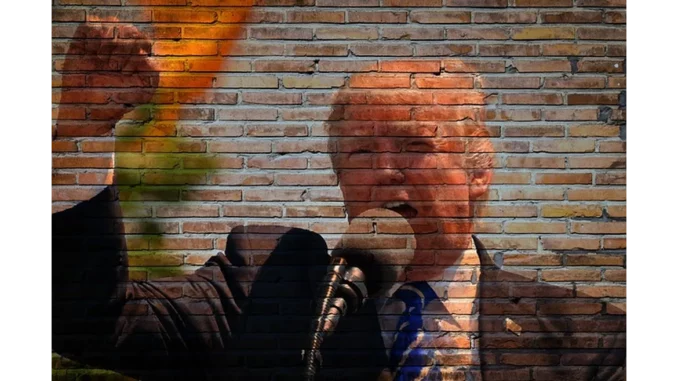
Former President Donald Trump has once again ignited substantial debate with his recent remarks on the US government’s approach to managing its cryptocurrency assets. In an interview with YouTuber Adin Ross, Trump criticized the government’s decision to liquidate its Bitcoin holdings, suggesting that the United States should instead be accumulating cryptocurrency reserves. This viewpoint extends beyond mere fiscal policy, touching on strategic, economic, and geopolitical considerations that warrant a deeper exploration.
Trump’s argument against selling government-owned Bitcoin is primarily rooted in strategic foresight. He equates the significance of cryptocurrency to that of artificial intelligence, emphasizing that both are transformative technologies the United States cannot afford to neglect. By divesting its Bitcoin holdings, Trump argues, the US risks losing its competitive edge to nations like China, which, despite its ban on cryptocurrency trading and mining, continues to make substantial investments in this sector through alternative channels. This stance underscores the need for the US to remain technologically robust and forward-thinking to maintain its global standing.
From an economic perspective, Trump’s proposal is provocative. He advocates for a national Bitcoin stockpile, positing that these digital assets could help mitigate the US’s staggering $35 trillion debt. This suggestion, however, is not without its detractors. Economists like Justin Wolfers caution against such a strategy, highlighting the inherent volatility and speculative nature of cryptocurrencies. Nevertheless, Trump’s idea does bring to light the potential role of Bitcoin as a hedge against traditional financial systems, especially during periods of economic instability. This viewpoint invites further discussion on the viability of integrating digital currencies into national fiscal strategies.
The geopolitical ramifications of Trump’s stance are equally significant. By framing the issue within the context of national security and global competitiveness, Trump asserts that the US must take an active role in the burgeoning cryptocurrency market. This argument gains particular relevance in light of China’s assertive technological advancements and its development of a digital yuan. If the US were to divest its cryptocurrency holdings, it might inadvertently relinquish substantial ground to geopolitical adversaries. This perspective necessitates a reevaluation of how digital currencies can be leveraged to bolster national security and international influence.
The regulatory environment surrounding cryptocurrencies in the US has been a contentious topic. The Securities and Exchange Commission (SEC) has frequently highlighted the volatility of the cryptocurrency industry and its potential violations of securities laws. Despite this, there has been a growing acceptance of digital currencies among the public and institutional investors, fueled in part by endorsements from major Wall Street entities and influential figures like Elon Musk. Trump’s comments could sway future regulatory policies, potentially fostering a more conducive environment for cryptocurrency innovation and investment.
Political dynamics are also at play as the 2024 US elections loom on the horizon. Trump’s remarks appear to be a strategic move to garner support from the increasingly influential crypto community. Leading cryptocurrency firms have funneled over $150 million into political action committees (PACs) to back pro-crypto candidates. This burgeoning political influence could shape forthcoming legislation and regulatory frameworks, making the upcoming elections a critical juncture for the industry. Additionally, the widespread adoption of digital assets, now owned by one in five Americans, underscores the potential for these issues to sway electoral outcomes.
Public perception of cryptocurrencies has evolved markedly in recent years, with digital assets gaining traction among approximately 52 million Americans. This widespread adoption could significantly impact voter behavior, as candidates endorsing cryptocurrency innovation may find themselves appealing to a substantial and growing voter base. Trump’s advocacy for digital currencies could further legitimize them in the public eye, potentially spurring broader adoption and investment.
Market reactions to Trump’s comments have been varied. Following the interview, Bitcoin saw a modest recovery, trading at $56,020.27, reflecting a 2.27% increase over the previous 24 hours. However, the market remains susceptible to fluctuations driven by broader economic and geopolitical factors. The US Department of Justice’s recent transfer of $2 billion worth of Bitcoin from its cold wallet has also fueled speculation, raising questions about whether the government plans to sell these assets or is merely optimizing its holdings.
As we look ahead, the trajectory of US government policy on cryptocurrency remains uncertain. Trump’s comments have undeniably added a new dimension to the debate, emphasizing the need for strategic and long-term planning. Whether his views will catalyze concrete policy changes is yet to be determined, but they have certainly sparked a broader conversation about the role of digital currencies in the global economic landscape. By advocating for the retention and strategic use of government-owned Bitcoin, Trump highlights the potential for these digital assets to serve as instruments of national economic strategy and geopolitical leverage. His remarks have significant implications for regulatory frameworks, political dynamics, and public perception, ensuring that the debate over the US government’s cryptocurrency policy will remain a critical issue for policymakers, investors, and voters in the coming years.

Be the first to comment